- Home
- T. H. White
Candle in the Wind
Candle in the Wind Read online
Candle in the Wind
Table of Contents
Epigraph
Chapter I
Chapter II
Chapter III
Chapter IV
Chapter V
Chapter VI
Chapter VII
Chapter VIII
Chapter IX
Chapter X
Chapter XI
Chapter XII
Chapter XIII
Chapter XIV
Candle in the Wind
T. H. White
Copyright © 2015 epubBooks
All Rights Reserved.
This publication is protected by copyright. By payment of the required fees, you have been granted the non-exclusive, non-transferable right to access and read the text of this ebook on-screen or via personal text-to-speech computer systems. No part of this text may be reproduced, transmitted, downloaded, decompiled, reverse engineered, stored in or introduced into any information storage and retrieval system, in any form or by any means, whether electronic or mechanical, now known or hereinafter invented, without the express written permission of epubBooks.
www.epubbooks.com
* * *
Epigraph
"He thought a little and said:
'I have found the Zoological Gardens of service to many of my patients.
I should prescribe for Mr. Pontifex a course of the larger mammals.
Don't let him think he is taking them medicinally….'"
Chapter I
The addition of years had not been kind to Agravaine. Even when he was forty he had looked his present age, which was fifty–five. He was seldom sober.
Mordred, the cold wisp of a man, did not seem to have any age. His years, like the depths of his blue eyes and the inflexions of his musical voice, were non–committal.
The two were standing in the cloisters of the Orkney palace at Camelot, looking out at the hawks who sat beneath the sun, on their blocks in the green courtyard. The cloisters had the new–fashioned flamboyant arches, in whose graceful frames the hawks stood out with noble indifference—a jerfalcon, a goshawk, a falcon and her tiercel, and four little merlins who had been kept all winter, yet had survived. The blocks were clean—for the sportsmen of those days considered that, if you went in for blood sports, it was your duty to conceal the beastliness with scrupulous care. All were lovingly ornamented with Spanish leather in scarlet, and with gold tooling. The leashes of the hawks were plaited out of white horse leather. The jer had a snow–white leash and jesses cut from guaranteed unicorn skin, as a tribute to her station in life. She had been brought all the way from Iceland, and that was the least they could do for her.
Mordred said pleasantly: "For God his sake let's get out of this. The place stinks."
When he spoke the hawks moved slightly, so that their bells gave a whisper of sound. The bells had been brought from the Indies, regardless of expense, and the pair worn by the jer were made of silver. An enormous eagle–owl who was sometimes used as a decoy, but who was at present standing on a perch in the shade of the cloister, opened his eyes when the bells rang. Before he had opened them, he might have been a stuffed owl, a dowdy bundle of feathers. The moment they had dawned, he was a creature from Edgar Allan Poe. You hardly liked to look at him. They were red eyes, homicidal, terrific, seeming actually to give out light. They were like rubies filled with flame. He was called the Grand Duke.
"I don't smell anything," said Agravaine. He sniffed suspiciously, trying to smell. But his palate was gone, both for smell and taste, and he had a headache.
"It stinks of Sport," said Mordred in inverted commas, "and the Done Thing and the Best People. Let's go to the garden."
Agravaine returned tenaciously to the subject which they had been discussing.
"It is no good making a fuss about it," he said. "We know the rights and wrongs, but nobody else knows. Nobody would listen."
"But they must listen." Small flecks in the iris of Mordred's eyes burned with a turquoise light, as bright as the owl's. Instead of being a foppish man with a crooked shoulder, dressed in extravagant clothes, he became a Cause. He became, on this matter, everything which Arthur was not—the irreconcilable opposite of the Englishman. He became the invincible Gael, the scion of desperate races more ancient than Arthur's, and more subtle. Now, when he was on fire with his Cause, Arthur's justice seemed bourgeois and obtuse beside him. It seemed merely to be dull complacency, beside the savagery and feral wit of the Pict. His maternal ancestors crowded into his face when he was spurning at Arthur—ancestors whose civilization, like Mordred's, had been matriarchal: who had ridden bare–back, charged in chariots, fought by stratagem, and ornamented their grisly strongholds with the heads of enemies. They had marched, long–haired and ferocious, an ancient writer tells us, "sword in hand, against rivers in flood or against the storm–tossed ocean." They were the race, now represented by the Irish Republican Army rather than by the Scots Nationalists, who had always murdered landlords and blamed them for being murdered—the race which could make a national hero of a man like Lynchahaun, because he bit off a woman's nose and she a Gall—the race which had been expelled by the volcano of history into the far quarters of the globe, where, with a venomous sense of grievance and inferiority, they even nowadays proclaim their ancient megalomania. They were the Catholics who could fly directly in the face of any pope or saint—Adrian, Alexander or St. Jerome—if the saint's policies did not suit their own convenience: the hysterically touchy, sorrowful, flayed defenders of a broken heritage. They were the race whose barbarous, cunning, valiant defiance had been enslaved, long centuries before, by the foreign people whom Arthur represented. This was one of the barriers between the father and his son.
Agravaine said: "Mordred, I want to talk. There doesn't seem to be anywhere to sit. Sit on that thing, and I will sit here. Nobody can hear us."
"I don't mind if they do hear. That is what we want. It should be said out loud, not whispered in cloisters."
"The whispers will get there in the end."
"No, they won't. That is what they won't do. He doesn't want to hear, and, so long as we whisper, he can always pretend that he can't. You are not the King of England for all these years, without knowing how to use hypocrisy."
Agravaine was uncomfortable. His hatred for the King was not a reality like Mordred's—indeed, he had little personal feeling against anybody except Lancelot. His attitude was more of malice at random.
"I don't think it is any good complaining about what happened in the past," he said gloomily. "We can't expect other people to side with us when everything is complicated, and happened so long ago."
"It may have happened long ago, but that doesn't alter the fact that Arthur is my father, and that he turned me adrift in a boat as a baby."
"It may not alter it for you," said Agravaine, "but it alters it for other people. It is such a muddle that nobody cares. You can't expect ordinary people to remember about grandfathers and half–sisters and things of that sort. In any case human beings don't go to war for private quarrels nowadays. You need a national grievance—something to do with politics which is waiting to burst out. You need to use the tools which are ready to hand. This man John Ball, for instance, who believes in communism: he has thousands of followers who would be ready to help in a disturbance, for their own purposes. Or there are the Saxons. We could say we were in favour of a national movement. For that matter, we could join them together and call it national communism. But it has to be something broad and popular, which everybody can feel. It must be against large numbers of people, like the Jews or the Normans or the Saxons, so that everybody can be angry. Either we must be the leaders of the Old Ones, who seek for justice against the Saxon: or of the Saxon a
gainst the Norman; or of the serf against society. We want a banner, yes, and a badge too. You could use the Fylfot. Communism, Nationalism, something like that. But as for a private grudge against the old man, it's useless. Anyway it would take you half an hour to explain it, even if you did begin to shout it from the rooftops."
"I could shout that my mother was his sister, and that he tried to drown me because of that."
"If you wanted to," said Agravaine.
They had been talking, before the eagle–owl woke up, about the earlier wrongs of their family—about their grandmother, Igraine, who had been wronged by Arthur's father—about all the long–gone feud of Gael and Gall, which had been taught them by their dam in old Dunlothian. It was these wrongs which Agravaine's colder blood could recognize as far too distant and confused to serve as weapons against the King. Now they had reached the more recent grievance—the sin of Arthur with his half–sister which had ended in an attempt to murder the bastard who resulted. These might certainly be stronger weapons, but the trouble was that Mordred was himself the bastard. The elder brother's cowardice told him, in his craftier head, that a son could hardly raise his illegitimacy as a banner under which to overthrow his father. Besides, the business had been hushed up long before, by Arthur. It seemed bad policy that Mordred should be the one to bring it up.
They sat in silence, looking at the floor. Agravaine was out of condition, with pouches under his eyes. Mordred was as slim as ever, a neat figure in the height of fashion. The exaggeration of his dress made a good camouflage for him, under which you hardly noticed his crooked shoulder.
He said: "I am not proud."
He looked bitterly at his half–brother, putting more meaning into the look than the other could be expected to catch. He was saying with his eyes: "Look at my hump, then. I have no reason to be proud of my birth."
Agravaine got up impatiently.
"I must have a drink in any case," he said, clapping his hands for the page. Then he passed his trembling fingers over his eyelids and stood wearily, looking at the owl with distaste. Mordred, while they were waiting for the drink, watched him with contempt.
"If you rake the old muck," said Agravaine, revived by the hippocras, "you will get yourself in the muck. We are not in Lothian, you must remember. We are in Arthur's England, and his English love him. Either they will refuse to believe you, or, if they do believe you, they will blame you, and not him, because it was you who brought the matter up. It is certain that not a single man would follow a rebellion of that sort."
Mordred looked at him. He was hating him, like the owl—condemning him as a coward. He could not bear to be thwarted in his day–dream of revenge, so he was wreaking his spite on Agravaine in his thoughts, saying to himself that the latter was a drunken traitor to the family.
Agravaine saw this, and, already consoled by half the bottle, laughed in his face. He patted the good shoulder, forcing the younger man to fill his glass.
"Drink," he said, chuckling. Mordred drank like a cat being dosed.
"Have you heard," asked Agravaine waggishly, "of a mighty saint called Lancelot?"
He winked one of the pouchy eyes, looking down his nose with benevolence.
"Go on."
"I gather you have heard about our preux chevalier."
"I know Sir Lancelot, of course."
"I think I am not wrong in saying that this pure gentleman has given both of us a fall or two?"
"The first time Lancelot unhorsed me," said Mordred, "is so long ago that I can't remember. But it means nothing. Because a man can push you off a horse with a stick, it doesn't mean that he is a better man than you are."
It was a strange feature—now that Lancelot was in the conversation—that Mordred's vivid feeling was exchanged for indifference. But Agravaine, who had been reluctant before this, became fluent.
"Precisely," he said. "And our noble knight has been the Queen of England's lover all the time."
"Everybody knows that Gwen has been Lancelot's mistress since before the deluge, but what good is that? The King knows it himself. He has been told so three times, to my certain knowledge. I don't see that we can do anything."
Agravaine put his finger by the side of his nose like a drunken piper, then shook it at his brother.
"He has been told so," he announced, "but in roundabout ways. People have sent him hints, such as shields with cognizances on them that had double meanings, or horns which only faithful wives could drink from. But nobody has told him about it in open court, face to face. Meliagrance only made a general accusation, and even that was in the days of trial by battle. Think what would happen if we were to denounce Sir Lancelot personally, under these new–fashioned Laws, so that the King was forced to investigate."
Mordred's eyes dawned, as the owl's had done.
"Well?"
"I can't see that anything could happen, except a split. Arthur depends on Lancelot as his commander, and the chief of his troops. That is where his power comes from, because everybody knows that nobody can stand against brute force. But if we could make a little merry mischief between Arthur and Lancelot, because of the Queen, their power would be split. Then would be the time for policy. Then would be the time for discontented people, Lollards and Communists and Nationalists and all the riff–raff. Then would be the time to take your famous revenge."
"We could break them up, because they were broken among themselves."
"But it means more than that."
"It means that the Cornwalls would be even for grandfather and I for mother…"
"…not by using force against force, but by using our brains."
"It means that I could revenge myself on the man who tried to drown me as a baby…"
"…by getting behind the bully first, and then by being a little careful."
"Behind our famous Double Blue…"
"…Sir Lancelot!"
The position was, and perhaps it may as well be laboured for the last time, that Arthur's father had killed the Earl of Cornwall. He had killed the man because he wanted to enjoy the wife. On the night of the Earl's killing, Arthur had been conceived upon the unfortunate countess. Being born too soon for the various conventions of mourning, marriage, and so forth, he had been secretly put to nurse with Sir Ector of the Forest Sauvage. He had grown up in ignorance of his parentage until, when he was a young boy of nineteen summers, he had fallen in with Morgause, without knowing that she was one of his half–sisters by the Countess and the slaughtered Earl. This half–sister, already the mother of Gawaine, Agravaine, Gaheris, and Gareth, had been twice the age of the young King—and she had successfully seduced him. The offspring of their union had been Mordred, who had been brought up alone with his mother, in the barbarous remoteness of the outer Isles. He had been brought up alone with Morgause, because he was so much younger than the rest of the family. The others had already flown to the King's court—forced there by ambition because it was the greatest court in the world, or else to escape their mother. Mordred had been left to be dominated by her, with her ancestral grudge against the King and her personal spite. For, although she had contrived to seduce young Arthur in his nonage, he had escaped her—to settle down with Guenever as his wife. Morgause, brooding in the North with the one child who remained to her, had concentrated her maternal powers on the crooked boy. She had loved and forgotten him by turns, an insatiable carnivore who lived on the affections of her dogs, her children and her lovers. Eventually one of the other sons had cut her head off in a storm of jealousy, on discovering her in bed at the age of seventy with a young man called Sir Lamorak. Mordred—confused between the loves and hatreds of his frightful home—had at the time been a party to her assassination. Now, in the court of a father who had been considerate enough to hide the story of his birth, the wretched son found himself the acknowledged brother of Gawaine, Agravaine, Gaheris and Gareth—found himself lovingly treated by the King–father whom his mother had taught him to hate with all his heart—found himself misshap
en, intelligent, critical, in a civilization which was too straightforward for purely intellectual criticism—found himself, finally, the heir to a northern culture which has always been antagonistic to the blunt morals of the south.
Chapter II
The page who had brought Sir Agravaine's hippocras came in from the cloister door. He bowed double, with the exaggerated courtesy which was expected of pages before they became esquires on their way to knighthood, and announced: "Sir Gawaine, Sir Gaheris, Sir Gareth."
The three brothers followed him, boisterous from the open air and their recent doings, so that now the clan was complete. All of them, except Mordred, had wives of their own tucked away somewhere—but nobody ever saw them. Few saw the men themselves separate for long. There was something childish about them when they were together, which was attractive rather than the reverse. Perhaps there was something childish about all the paladins of Arthur's story—if being simple is the same as childishness.
Gawaine, who was the head of the family, walked first, with a falcon in juvenile plumage on his fist. The burly fellow had pale hairs in his red head now. Over the ears it was yellowish, the colour of a ferret's, and would soon be white. Gaheris looked like him, or at least he was more like him than the others. But his was a milder copy: not so red, nor so strong, nor so big, nor so obstinate. Indeed, he was a bit of a fool. Gareth, the youngest of the full brothers, had retained the traces of his youth. He walked with a spring in his step, as though he enjoyed being alive.
"Tuts!" exclaimed Gawaine's hoarse voice in the doorway, "drinking already?" He still kept his outland accent in defiance of the mere English, but he had ceased to think in Gaelic. His English had improved against his will. He was getting old.
"Well, Gawaine, well."

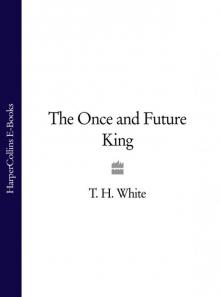 The Once and Future King (#1-4)
The Once and Future King (#1-4) Once & Future King 05 - The Book of Merlyn
Once & Future King 05 - The Book of Merlyn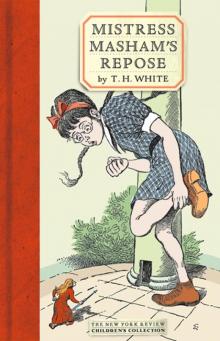 Mistress Masham's Repose
Mistress Masham's Repose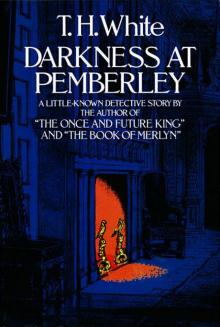 Darkness at Pemberley
Darkness at Pemberley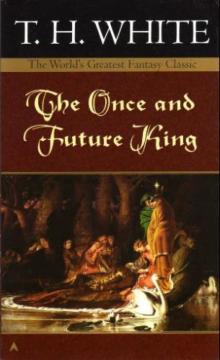 The Once and Future King
The Once and Future King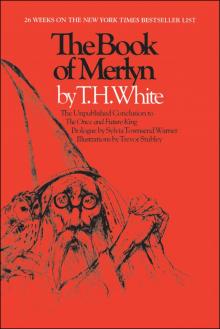 The Book of Merlyn
The Book of Merlyn Candle in the Wind
Candle in the Wind